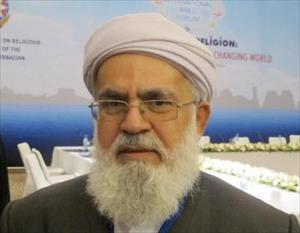(Ahlul Bayt News Agency) - Molavi Es’haq Madani, prominent Sunni figure in an interview explained his views on the meaning of Islamic proximity, ways to avoid division, Islamic view on excommunication and also the theme for the upcoming Islamic Unity Conference as well as the Sunni view on Imam Hussein (AS), the third Shia Imam and grandson of Prophet Mohammad (PBUH). Q: What is the meaning of proximity in your view and how can the theme be applied to the life of the people? A: Proximity is to bring hearts together; it is a study into the elements which have distanced the hearts either they are religious disagreements or merely some vain accusations against us. Although Shia and Sunni scholars have their particular religious statements, they are close together and what in fact distances them is not a disagreement on religious views but what is imposed on them from outside of religious frames. There are some extremist moves which are not approved by any denomination. However it occurs that we are taken in by some of these accusations and start to grow hatred from each other but when we have a dialogue and listen to each other, then these accusations fall ineffective. When we speak about proximity, it does not mean that the other group has to accept my views and the other way round. We can live together, listen to each other and nothing can prevent our fraternity. In fact what leads to disagreement and intrigue includes, extremism, ignoring true Islamic principles and not thinking over the issues. Q: What is Islamic view on excommunication and how can it affect solidarity among Muslims? A: Firstly, only the experts, first level heads of a denomination or group, have to release fatwas (statements) on the issue. What we hear as excommunication is from some very low levels and not the leaders. We have to know the views of Shia and Sunni scholars on Islam and how they define a Muslim. For instance according to Imam Hanifa, he who prays towards Qibla (praying direction of all Muslims) is a Muslim and he or she cannot be excommunicated. Now the question is which one of the Muslims who is excommunicated at present does not believe in Qibla? Other Muslim leaders also do not excommunicate other Islamic denominations; hence, these are a group of extremist moves caused by ignoring interests of Islam. Q: In your view what elements are the most important to confront hostile intrigues by enemies? A: Enemies make the best of any opportunity to fuel a war between Muslims. For instance, to cheat the simple minded people, they overstate and expand a minor mistake made by a Shia among Sunni community. Now the point is that the person who has made the mistake is not among Shia scholars or even top figures of the denomination. In the same breath when a Sunni person says something about Shia firstly you have to find who the speaker is. What the enemies make the best use of is ignorance of the Islamic nation. Since we do not maintain this issue, with the most unimportant rumor, one denomination invades the other with fatwas; therefore, we have to study into issues to find if they are accusations or a true believer is behind them or even if they are believed by all members of that group. If followers of Islamic denominations take the true views from top scholars of other denominations, then they will not be taken in by enemies. Q: This year Islamic Unity Conference will be held with the theme of holy Qur’an. To what extent do you think this annual conference is helpful for institutionalizing Islamic proximity? A: Islamic Unity Conference is an important mission of the World Forum for Proximity of Islamic Schools of Thought but it is noteworthy that not all problems are solved by the event. Muslim scholars from different denominations across the world convene and listen to each other. This one task is beneficial for the Islamic nation and will certainly have positive effects by bringing the hearts nearer. Undoubtedly the event has great achievements however we cannot claim that all issues in the world of Islam are solved through this annual conference. Holy book of Islam is a shared possession among all members of the Islamic nation. Apart from what the enemies might say in vain, there is not even one individual in the Islamic nation who rejects holy Qur’an. All Islamic schools of thought unanimously approve Qur’an and the best spot to start unity is the holy book of Islam. Q: Mourning days for martyrdom anniversary of Imam Hussein (AS) is underway. How is third Shia Imam viewed by Sunni community? What is the role of Imam Hussein (AS) uprising in Islamic unity? A: Sunni Muslims do not hesitate in expressing their affection and loyalty to household of Prophet Mohammad (AS) and the love of Prophet (PBUH) towards Imam Hassan and Imam Hussein (AS) is always stressed in Sunni sermons. Besides the facial similarity to Prophet Mohammad (PBUH), there is no doubt in their high stance and the love they had for the Prophet of Islam (PBUH). To love the two Shia Imams(AS) is an ambition of both Shia and Sunni Muslims. Battle of Karbala and martyrdom of Imam Hussein (AS) is one of the weird issues in the history of Islam and his uprising was an uprising of brevity and gallantry against oppression. The point that his Battle of Karbala has been a unique event when someone fought and revealed the weakness of his enemies is approved by both Shia and Sunni./149
source : TNA
Saturday
16 November 2013
8:30:00 PM
481779

Member of the Supreme Council at the World Forum for Proximity of Islamic Schools of Thought stressed the necessity of a deeper look into the grounds for dispersion in the Muslim world and the ways to reach proximity counting annual Islamic Unity Conference as part of proximity programs by the center.
